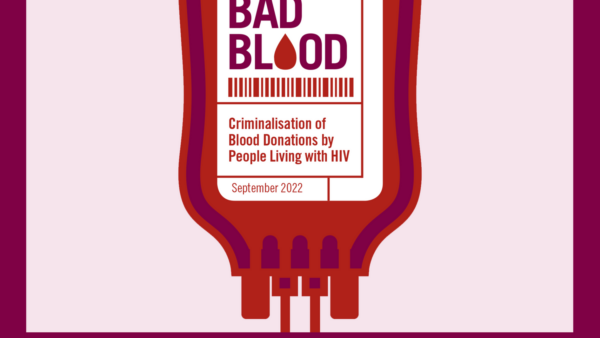Overview
The Infectious Diseases Act, which came into force in 2003 and was amended in 2010, introduced a number of provisions which specifically regulate and criminalise those living with HIV in Brunei. Both HIV and AIDS are specifically defined as ‘infectious diseases’ within the First Schedule of the Act.
Section 24 states that “a person who knows that he (sic) has AIDS or HIV infection” shall not have sexual intercourse with another unless the person has been “informed of the risk of contracting AIDS or HIV” from that person and has “voluntarily agreed to accept that risk”. This provision carries a penalty of a fine not exceeding $10,000 and/or up to two years’ imprisonment.
Section 25 prohibits anyone who knows they have HIV from making a blood donation or doing “any act which is likely to transmit or spread AIDS or HIV infection to another person.” The penalty under this section is a fine not exceeding $50,000 and/or up to two years’ imprisonment (see our report, Bad Blood, for a global analysis of the criminalisation of blood donations).
A person is deemed to know they have HIV for the purposes of these provisions if a serological test has been taken to determine HIV status, a positive result has been returned, and this has been communicated to them.
As well as imposing restrictions on those living with HIV, the Infectious Diseases Act also imposes obligations. Section 8 gives the Director-General the power to compel anyone who is or is suspected of having an infectious disease to submit to examinations or treatment. Section 23 states that a person diagnosed as HIV-positive may be required to undergo counselling or comply with “such precautions and safety measures” as specified by the Director-General. Failure to comply can result in a fine not exceeding $10,000 and/or up to two years’ imprisonment.
The law, under Section 6, also imposes duties on others, including medical practitioners, to notify the Director-General if they know or suspect someone is carrying an infectious disease. Section 26 contains some measures designed to protect the identity of those living with HIV.
To date there have been no reported cases.
Laws
Infectious Diseases Act
Section 24 – Sexual intercourse by persons with AIDS or HIV infection
(1) A person who knows that he has AIDS or HIV Infection shall not have sexual intercourse with another person unless, before the sexual intercourse takes place, the other person —
(a) has been informed of the risk of contracting AIDS or HIV Infection from him; and
(b) has voluntarily agreed to accept that risk.
(2) Any person who contravenes subsection (1) is guilty of an offence and liable on conviction to a fine not exceeding $10,000, imprisonment for a term not exceeding 2 years or both.
(3) For the purposes of this section, a person shall not, only by reason of age, be presumed incapable of having sexual intercourse.
(4) For the purposes of this section and section 25, a person shall be deemed to know that he has AIDS or HIV Infection if a serological test or any other prescribed test for the purpose of ascertaining the presence of HIV Infection carried out on him has given a positive result and the result was communicated to him.
(5) In this section, “sexual intercourse” means —
(a) sexual connection occasioned by the introduction into the vagina, anus or mouth of any person of any part of the penis of another person; or
(b) cunnilingus.
Section 25 – Blood donation and other acts by persons with AIDs or HIV infection
(1) Any person who knows that he has AIDS or HIV Infection shall not —
(a) donate blood at any blood bank in Brunei Darussalam; or
(b) do any act which is likely to transmit or spread AIDS or HIV Infection to another person.
(2) Any person who contravenes subsection (1) is guilty of an offence and liable on conviction to a fine not exceeding $50,000, imprisonment for a term not exceeding 2 years or both.
Infectious Diseases Act
Section 6 – Notification of Infectious Diseases
(1) Every medical practitioner who has reason to believe or suspect that any person attended or treated by him is suffering from an infectious disease or is a carrier of that disease shall notify the Director-General within such time and in such form or manner, as the Director-General may require.
(2) Every person in charge of a laboratory used for the diagnosis of disease who becomes aware of the existence of an infectious disease in the course of his work shall notify the Director-General within such time and in such form or manner, as the Director-General may require.
(3) Any person who is aware or who suspects that any other person is suffering or has died from or is a carrier of an infectious disease shall notify the Director-General within such time and in such form or manner, as the Director-General may require.
(4) Any person who is required to notify the Director-General under this section shall give any other particulars required by the Director-General so far as they can be reasonably ascertained by him or are within his knowledge.
(5) Any person who fails to comply with the requirements of this section or furnishes as true information which he knows or has reason to believe to be false is guilty of an offence.
(6) When any person who is charged with failing to comply with the requirements of subsections (1), (2) or (3) in relation to the notification of an infectious disease, he shall be presumed to have known of the existence of the disease unless he proves to the satisfaction of the court that he had no such knowledge and could not with reasonable diligence have obtained such knowledge.
Section 11 – Offence for supplying false or misleading information
(1) Any person who
(a) donates any blood or blood product at any blood bank or hospital in Brunei Darussalam for any use or purpose; and
(b) directly in connection with such donation of blood or blood product, supplies any material information which he knows to be false or misleading,
is guilty of an offence and liable on conviction to a fine not exceeding $20,000, imprisonment for a term not exceeding 2 years or both.
(2) In this section, “material information” means any information directly relating to the likelihood of transmission of an infectious disease by the use of any blood or blood product.
Section 22 – Certain persons not to act in manner likely to spread disease
(1) A person who know or has reason to suspect that he is a case or carrier or contact of a disease set out in the Fifth Schedule shall not expose other persons to the risk of infection by his presence or conduct in any public place or any other place used in common by persons other than the members of his own family or household.
(2) A person having the care of another person whom he knows or has reason to suspect is a case or carrier or contact of a disease set out in the Fifth Schedule shall not cause or permit that person to expose other persons to the risk of infection by that person’s presence or conduct in any such place.
(3) A person shall not lend, sell, transmit or expose, without previous disinfection, any clothing, bedding or rags which he knows to have been exposed to infection from a disease set out in the Fifth Schedule, or any other article which he knows to have been so exposed and which is liable to carry such infection.
(4) Any person who contravenes subsections (1), (2) or (3) is guilty of an offence.
(5) A person shall not incur any liability for contravening subsection (1) if his presence or conduct in a place mentioned in that subsection is necessary for the purpose of obtaining medical treatment.
(6) Where the Director-General has designated a hospital or other place for the treatment of the disease, subsection (5) shall only apply in relation to the obtaining of medical treatment at the designated hospital or place.
(7) A person shall not incur any liability for contravening subsection (3) by transmitting with proper precautions any article for the purpose of having it disinfected.
Acknowledgements
Our thanks to Australian law firm Hall & Wilcox for their research assistance to confirm current relevant legislation.
HIV Justice Network's Positive Destinations
Visit the Brunei Darussalam page on Positive Destinations for information on regulations that restrict entry, stay, and residency based on HIV-positive status, as well as access to HIV treatment for non-nationals.

